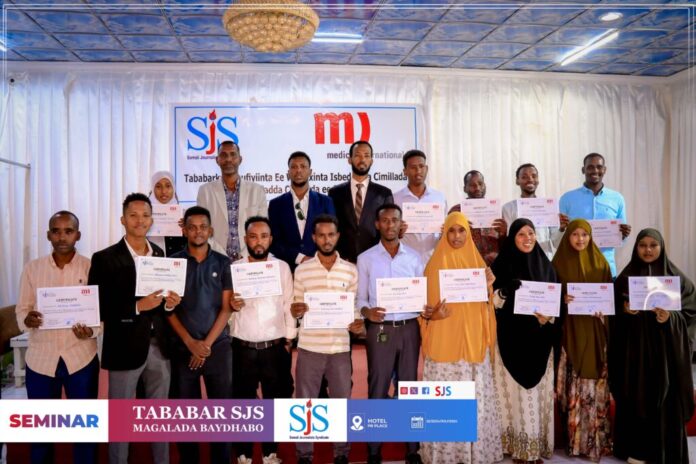Mogadisho (KAAB TV) – The Somali Journalists Syndicate (SJS) completes training for 15 local journalists in Southwest State, Somalia, as part of its ongoing initiative to enhance climate change reporting and climate justice in the country.
The three-day journalists’ training, attended by 15 reporters, was held in Baidoa from 22-24 July. With funding from Medico International, SJS has trained 30 local journalists, including women reporters from the worst-affected communities in Mogadishu, Lower Shabelle, and Jubbaland’s Gedo region from 2022 to 2023. This year, we plan to add 30 more journalists from the Southwest and Hirshabelle regional states, which have recently been hit by a series of climate-related incidents.
Prior to the training, the Southwest State cabinet held a special meeting and issued a call for increased awareness of the impact of climate change and, for preparing local populations with adaptation and mitigation strategies. SJS also conducted a local assessment by asking both journalists and affected communities about the level of climate change impact and the best ways to raise awareness through the media. A video documentary on this assessment is available online.
“I think I am now capable of preparing reports that not only address the problems of climate change but also focus on finding solutions to the challenges faced by the communities, the environment, and livestock,” said Mohamed Ali Baaqow, a journalist at radio Voice of Bay and Bakool.
Many of the journalists selected for the training, including Mohamed and his colleagues, had not previously received training on climate change issues emphasizing that the challenge lies not only in the impact of climate shocks witnessed by the communities but also in the lack of understanding among local communities and the media about why recurring climate change events are occurring.

“When interviewed people affected by droughts, floods, and other climate change-related issues, they often describe these problems as recurring and worsening. However, we as journalists often do not explore the underlying causes. That’s what I have personally gained from the training,” said Shamso Sharif Bataar, the head of news at Radio and TV of the Voice of Bay and Bakool,
South West State (SWS), known as the breadbasket of Somalia, is one of the hardest hit regions by food shortages. Over 80% of the sorghum consumed in Somalia is produced on rain-fed farms in the Bay region, and livestock from Bay and Bakol, particularly goats and camels, are highly valued nationwide. However, recurring droughts, insufficient rainfall and the threats posed by Al-Shabaab, are severely impacting crop production, leading to widespread food insecurity. Consequently, Baidoa, the temporary capital of SWS, now hosts thousands of internally displaced persons who have fled their homes due to conflict and food shortages.
Joining the SJS training on the last day, the SWS Deputy Minister of Information, MP Ahmed Bashir Ahmed stated that having skilled journalists who have received proper training can significantly increase community awareness on the issue of climate change.

“The government policy is to raise the awareness of the communities and educate them on this worsening impact of the climate change. I, therefore, urge you to implement the knowledge you gained from this training. It is crucial to tell the stories of those affected by these problems, raise public awareness and to highlight potential solutions,” MP Ahmed Bashir told journalists at the third and final day of the training activity.
SJS Secretary General Abdalle Mumin stated that, despite limited resources, SJS is working to build the capacity of local media to effectively report on the conditions faced by the most vulnerable communities in the midst of the climate change crisis.

“The injustice of climate change has led to unequal impacts among affected communities in Somalia. The most vulnerable, including women, children, and the rural communities, suffer disproportionately from climate change issues. This has also affected the security, the economy, and social cohesion,” Abdalle Mumin said.
“Half of the communal conflicts in Somalia are related to issues such as grazing land and access to water and food. This demonstrates that the effects of climate change is impacting peace and stability as well. This is why it is crucial for the local media and journalists to be part of the solution,” Mumin added.


